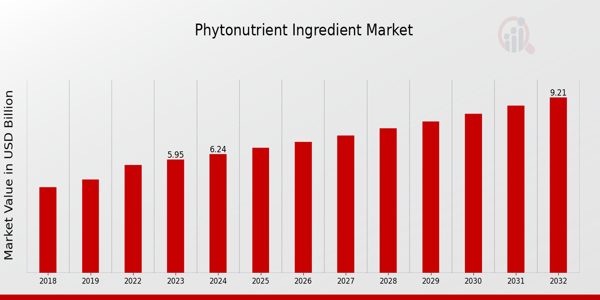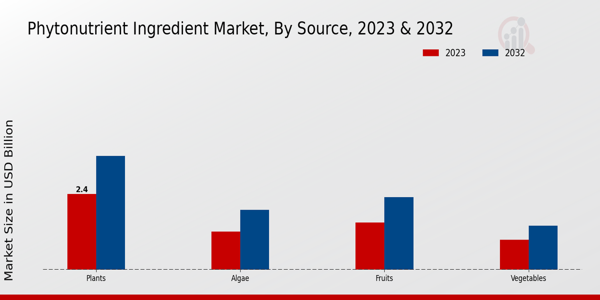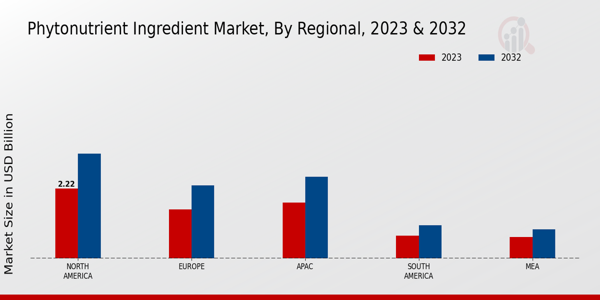Global Phytonutrient Ingredient Market Overview
Phytonutrient Ingredient Market Size was estimated at 5.67 (USD Billion) in 2022. The Phytonutrient Ingredient Industry is expected to grow from 5.95 (USD Billion) in 2023 to 9.2 (USD Billion) by 2032. The Phytonutrient Ingredient Market CAGR (growth rate) is expected to be around 4.97% during the forecast period (2024 - 2032).

Source Primary Research, Secondary Research, MRFR Database and Analyst Review
Key Phytonutrient Ingredient Market Trends Highlighted
The phytonutrient ingredient market is experiencing significant growth driven by increasing consumer awareness of health and wellness. More people are looking for natural and plant-based supplements to enhance their dietary intake. This shift towards healthier eating habits has led to a greater demand for phytonutrient-rich foods and supplements. Additionally, the rise in chronic diseases and the aging population have prompted individuals to seek preventive health measures, further boosting the demand for phytonutrients. Companies are focusing on product innovation and development to cater to the growing consumer preference for functional foods that promote overall well-being.The phytonutrient ingredient market has a number of potential opportunities to develop. There is an increase in the population, especially among vegans and vegetarians, which will broaden the market for plant-based ingredients and supplements. This trend toward clean-label products allows companies to get away from formulating instruction that limits the use of phytonutrients and emphasizes their benefits instead. Partnerships with health and wellness brands, as well as penetration into new and fast-growing regions can also allow companies to reach new customer base looking for natural ways to approach health. Overall, the trends in recent months show that there is a demand for sustainable sourcing and production processes for phytonutrient ingredients.Consumers are becoming more conscious of environmental impacts, prompting manufacturers to adopt eco-friendly practices. There is also a surge in digital marketing strategies aimed at educating consumers about the benefits of phytonutrients. The increasing use of social media platforms to promote health products is changing how brands engage with customers, making it essential for companies to adapt their marketing approaches. Overall, the phytonutrient ingredient market is poised for continued innovation and growth as it aligns with modern consumer preferences for health, wellness, and sustainability.
Phytonutrient Ingredient Market Drivers
Growing Consumer Awareness of Health Benefits
One of the most significant market drivers for the Phytonutrient Ingredient Market Industry is the increasing consumer awareness regarding the health benefits associated with phytonutrients. As individuals become more health-conscious, they are seeking dietary options that can improve their overall well-being and reduce the risk of chronic diseases. This shift in consumer behavior is driven by a variety of factors, including the rise of informative media, health campaigns, and an overall trend toward holistic wellness.Phytonutrients, known for their antioxidant, anti-inflammatory, and immune-boosting properties, are increasingly being recognized as key components of a healthy diet. As a result, there is a growing demand for products rich in phytonutrients, such as fruits, vegetables, and various dietary supplements. Furthermore, many consumers are actively seeking out food and beverage products that claim to be enhanced with phytonutrient ingredients, positioning these components as essential for maintaining optimal health.This heightened awareness not only promotes the consumption of such products but also encourages manufacturers to innovate and develop new offerings that cater to this health-centric consumer sentiment. With the ongoing trend towards plant-based diets and functional foods, the emphasis on phytonutrient-rich ingredients continues to gain traction, making it a pivotal driver for the growth of the market.
Rising Demand for Natural Ingredients in Food and Beverages
The increasing consumer preference for natural ingredients over synthetic alternatives is significantly driving the Phytonutrient Ingredient Market Industry. As health and wellness trends evolve, consumers are becoming more discerning about the ingredients used in their food and beverage products. This shift has led manufacturers to prioritize the inclusion of phytonutrients, which are naturally occurring compounds found in plants, as a means to enhance the nutritional profile of their offerings.The push for clean-label products that contain recognizable and wholesome ingredients is propelling the demand for phytonutrient supplements, as they align with the ideals of transparency and healthfulness that today's consumers expect. Brands are also leveraging this demand by marketing their products as 'natural' or 'plant-based,' further contributing to the growth of the phytonutrient ingredient market.
Increasing Adoption of Phytonutrients in Dietary Supplements
The surge in health-conscious consumers is leading to greater adoption of phytonutrients in dietary supplements within the Phytonutrient Ingredient Market Industry. As individuals look for convenient ways to enhance their nutrition and well-being, supplements containing phytonutrient ingredients are gaining popularity. This trend is particularly pronounced among individuals looking to manage specific health issues or improve their overall health.The growing availability of a wide range of dietary supplements infused with phytonutrients caters to various consumer needs and preferences, thereby driving market growth.
Phytonutrient Ingredient Market Segment Insights
Phytonutrient Ingredient Market Source Insights
The Phytonutrient Ingredient Market, focusing on the Source segment, showcases a diverse range of ingredients crucial for dietary and health applications. In 2023, this segment has garnered significant attention, with a total market valuation leading to $5.95 billion, with expectations for growth indicating a rise in interest in health-related products. Among the various categories, the Plants category emerges as the majority holding, valued at $2.4 billion in 2023, and is anticipated to rise to $3.6 billion by 2032, highlighting its significant role in health supplements, functional foods, and beverages, largely due to the rich variety of phytonutrients available in plant sources.On the other hand, the Algae segment holds a notable stake, valued at $1.2 billion in 2023 and progressing to $1.9 billion in 2032, reflecting a growing trend towards sustainable and vegan sources of nutrients, often leveraged for their high antioxidant properties and omega-3 fatty acids that cater to health-conscious consumers. Fruits, contributing $1.5 billion in 2023 and set to reach $2.3 billion in 2032, are recognized for their essential vitamins and minerals, playing a significant role in functional food markets due to their widespread availability and flavor profiles that enhance product acceptance among consumers.Lastly, the Vegetables segment, although valued at $0.95 billion in 2023 and expected to grow to $1.4 billion by 2032, still occupies a pivotal role in promoting overall health and wellness due to their fiber content and various nutrients, primarily focusing on the demand for natural and organic ingredients in consumer products. Overall, the Source segment of the Phytonutrient Ingredient Market underscores the importance of diverse natural ingredients while highlighting trends toward plant-based nutrition, sustainability, and the consumer's evolving preferences for health-focused products.The market growth is also driven by increasing awareness about the health benefits of phytonutrients, making these ingredients desirable for a wide range of applications in dietary supplements, functional foods, and beverages across the globe.

Source Primary Research, Secondary Research, MRFR Database and Analyst Review
Phytonutrient Ingredient Market Form Insights
The Phytonutrient Ingredient Market, valued at 5.95 USD Billion in 2023, showcases a varied landscape within its Form segment, which includes Powder, Liquid, Granules, and Tablet forms. This segment plays a crucial role in the overall market dynamics, with each form catering to distinct consumer preferences and applications. Powders often dominate due to their versatility in food and beverage formulations as well as dietary supplements. Liquids are gaining traction, particularly in functional drinks and nutraceuticals, where rapid absorption is essential.Granules offer convenience in the baking and cooking industries, allowing for easy integration into daily diets, while Tablets provide an efficient delivery method for targeted phytonutrients. As the Phytonutrient Ingredient Market experiences gradual market growth, driven by increasing health consciousness and demand for natural ingredients, each Form offers unique benefits, leading to shifting trends in consumer behavior and enhancing overall Phytonutrient Ingredient Market data and statistics. Strategic innovations and product development in these forms could potentially unlock significant opportunities within this sector as consumers continue to prioritize holistic health approaches.
Phytonutrient Ingredient Market Application Insights
In 2023, the Phytonutrient Ingredient Market was valued at 5.95 billion USD, reflecting a robust growth trajectory driven by increased consumer awareness regarding health benefits linked to phytonutrients. The market segmentation in the Application category includes Food Beverages, Dietary Supplements, Cosmetics, and Pharmaceuticals, each playing a vital role in the market's expansion. The Food Beverages sector is particularly significant, as it caters to a growing demand for natural ingredients that enhance flavor and nutritional value.Simultaneously, the Dietary Supplements category is majorly holding a substantial share, fueled by rising health consciousness and the pursuit of preventative healthcare solutions. The Cosmetics segment has gained traction, driven by the incorporation of phytonutrients for skin health and anti-aging benefits. Lastly, the Pharmaceutical application also remains crucial, given the ongoing research on the therapeutic potentials of phytonutrients. Overall, these segments collectively contribute to the Phytonutrient Ingredient Market statistics, showcasing a comprehensive landscape poised for sustained growth driven by health trends and consumer preferences.
Phytonutrient Ingredient Market Functionality Insights
The Phytonutrient Ingredient Market, valued at 5.95 billion USD in 2023, reflects robust growth due to its increasing association with health benefits derived from functionality. The segment is distinctly categorized into various facets such as antioxidants, anti-inflammatory, immune-boosting, and cholesterol-lowering attributes, each contributing significantly to market dynamics. Antioxidants are crucial for combating oxidative stress, thereby playing a vital role in chronic disease prevention and enhancing overall well-being, which leads to high consumer demand.Meanwhile, anti-inflammatory ingredients attract attention due to rising awareness of their potential in managing inflammation-related health issues. Immune-boosting phytonutrients are particularly significant in today's health-conscious society, as consumers increasingly seek to enhance immunity amidst health challenges. Furthermore, cholesterol-lowering components support heart health, resonating with an aging population concerned about cardiovascular issues. Collectively, these functionalities not only underscore the expanding market but also reflect growing consumer awareness and lifestyle changes favoring natural alternatives.As the market expands, these segments are poised to capitalize on favorable trends, presenting numerous opportunities for innovation and growth within the Phytonutrient Ingredient Market industry.
Phytonutrient Ingredient Market Regional Insights
The Phytonutrient Ingredient Market is projected to reach substantial valuations by 2032, with significant contributions from various regions. North America holds a majority share with a valuation of 2.22 USD Billion in 2023, growing to 3.32 USD Billion by 2032, driven by increasing health-conscious trends and demand for natural ingredients. Europe follows with a notable value of 1.55 USD Billion in 2023, set to rise to 2.31 USD Billion, fueled by stricter regulations favoring natural products. The APAC region, valued at 1.77 USD Billion in 2023 and expected to hit 2.59 USD Billion, shows potential due to the rising consumer awareness regarding health benefits linked to phytonutrients.In contrast, South America and the MEA regions showcase more modest growth, with values of 0.73 USD Billion and 0.68 USD Billion in 2023, respectively. These regions, while smaller, are expected to witness increased interest in natural health products, highlighting unique opportunities in local markets within the Phytonutrient Ingredient Market. Each region plays a crucial role, contributing to the market growth driven by consumer preferences for health-oriented products, sustainability, and a shift towards holistic wellness.

Source Primary Research, Secondary Research, MRFR Database and Analyst Review
Phytonutrient Ingredient Market Key Players and Competitive Insights
The Phytonutrient Ingredient Market is characterized by a dynamic competitive landscape marked by a diverse range of players engaged in the production and distribution of phytonutrient ingredients. These ingredients are derived from plant sources and are widely recognized for their health benefits, including antioxidant properties and disease prevention. The market's competitive intensity is driven by factors such as innovation in product formulation, advancements in extraction technologies, and increasing consumer awareness regarding the health benefits of plant-based ingredients. As health trends continue to evolve, companies in this sector are actively focusing on expanding their product portfolios, enhancing their supply chain efficiencies, and establishing strategic partnerships to capture a larger market share. With demand rising from various industries, including food and beverage, cosmetics, and dietary supplements, understanding the movements of key competitors is essential for stakeholders aiming to navigate this rapidly evolving market.Kemin Industries has established a significant presence in the Phytonutrient Ingredient Market through its commitment to quality and innovation. The company leverages advanced research and development capabilities to produce a range of phytonutrients that cater to the growing consumer demand for natural health solutions. Kemin's strengths lie in its robust supply chain infrastructure, which facilitates reliable sourcing of high-quality raw materials. Its focus on sustainability and environmental responsibility resonates with modern consumers who prioritize eco-friendly products. Furthermore, Kemin Industries places a strong emphasis on educating its customers about the benefits of phytonutrients, thus fostering a loyal consumer base. With a widespread distribution network and a reputation for excellence in product quality, Kemin Industries has positioned itself as a leader in this competitive market, consistently introducing innovative ingredients that meet the evolving needs of its clientele.Sabinsa Corporation is another influential player in the Phytonutrient Ingredient Market, recognized for its extensive range of plant-derived ingredients and commitment to scientific research. The company focuses on developing and supplying high-quality phytonutrient ingredients that support health and wellness. What sets Sabinsa apart is its steadfast dedication to transparency, quality, and efficacy, ensuring that its products are backed by rigorous scientific validation. Leveraging decades of experience, Sabinsa Corporation has established a solid foothold in various application areas, including nutraceuticals, pharmaceuticals, and food industries. Its proactive approach to regulatory compliance and quality assurance further enhances its credibility in the market. This ability to innovate while maintaining strict adherence to quality standards has enabled Sabinsa to gain a competitive edge, making it a preferred choice among formulators looking for reliable phytonutrient sources to enhance their product offerings.
Key Companies in the Phytonutrient Ingredient Market Include
- Kemin Industries
- Sabinsa Corporation
- Cargill
- Naturex
- Algenist
- Dairy Farmers of America
- Ginkgo BioWorks
- Herbalife Nutrition Ltd
- Archer Daniels Midland Company
- DSM
- Hansen
- BASF
- Nutraceutical International Corporation
- DuPont
- Natures Way
Phytonutrient Ingredient Market Industry Developments
Recent developments in the Phytonutrient Ingredient Market have showcased notable activities among key industry players such as Kemin Industries, Sabinsa Corporation, and Cargill. The market is witnessing increased demand for natural ingredients driven by consumer trends towards health and wellness. Companies like Naturex and Algenist are innovating with novel extraction processes to enhance the bioavailability of phytonutrients, further boosting their appeal in dietary supplements and functional foods. Furthermore, Dairy Farmers of America and Ginkgo BioWorks are collaborating to explore new applications of phytonutrients in dairy products, enhancing nutritional profiles. In terms of mergers and acquisitions, recent movements include strategic partnerships and acquisitions among companies like Herbalife Nutrition Ltd and Archer Daniels Midland Company aimed at expanding their product portfolios and market reach. The overall growth in market valuation for firms such as DSM, Chr. Hansen and BASF have contributed positively to the industry landscape, signaling a robust demand from sectors including food and beverage, cosmetics, and nutraceuticals. This dynamic environment reflects a significant evolution in the market, driven by innovation and a focus on sustainable, health-oriented ingredients.
Phytonutrient Ingredient Market Segmentation Insights
-
Phytonutrient Ingredient Market Source Outlook
- Plants
- Algae
- Fruits
- Vegetables
-
Phytonutrient Ingredient Market Form Outlook
- Powder
- Liquid
- Granules
- Tablet
-
Phytonutrient Ingredient Market Application Outlook
- Food Beverages
- Dietary Supplements
- Cosmetics
- Pharmaceuticals
-
Phytonutrient Ingredient Market Functionality Outlook
- Antioxidants
- Anti-Inflammatory
- Immune-Boosting
- Cholesterol-Lowering
-
Phytonutrient Ingredient Market Regional Outlook
- North America
- Europe
- South America
- Asia Pacific
- Middle East and Africa
|
Report Attribute/Metric
|
Details
|
|
Market Size 2022
|
5.67 (USD Billion)
|
|
Market Size 2023
|
5.95 (USD Billion)
|
|
Market Size 2032
|
9.2 (USD Billion)
|
|
Compound Annual Growth Rate (CAGR)
|
4.97% (2024 - 2032)
|
|
Report Coverage
|
Revenue Forecast, Competitive Landscape, Growth Factors, and Trends
|
|
Base Year
|
2023
|
|
Market Forecast Period
|
2024 - 2032
|
|
Historical Data
|
2019 - 2023
|
|
Market Forecast Units
|
USD Billion
|
|
Key Companies Profiled
|
Kemin Industries, Sabinsa Corporation, Cargill, Naturex, Algenist, Dairy Farmers of America, Ginkgo BioWorks, Herbalife Nutrition Ltd, Archer Daniels Midland Company, DSM, Chr. Hansen, BASF, Nutraceutical International Corporation, DuPont, Natures Way
|
|
Segments Covered
|
Source, Form, Application, Functionality, Regional
|
|
Key Market Opportunities
|
Growing demand for natural supplements, Rise in plant-based diets, Increasing health awareness globally, Expanding functional food sector, Advancements in extraction technologies
|
|
Key Market Dynamics
|
Increasing health consciousness, Rising demand for natural ingredients, Growing adoption in the food industry, Expanding applications in pharmaceuticals, Regulatory support and initiatives
|
|
Countries Covered
|
North America, Europe, APAC, South America, MEA
|
Frequently Asked Questions (FAQ) :
The Phytonutrient Ingredient Market is expected to be valued at 9.2 billion USD by 2032.
The expected CAGR for the Phytonutrient Ingredient Market from 2024 to 2032 is 4.97%.
North America is projected to have the highest market value at 3.32 billion USD by 2032.
The Plant segment of the Phytonutrient Ingredient Market is valued at 3.6 billion USD by 2032.
Major players in the market include Kemin Industries, Sabinsa Corporation, Cargill, DSM and Herbalife Nutrition Ltd.
The Algae segment of the Phytonutrient Ingredient Market is expected to reach 1.9 billion USD by 2032.
The market for Vegetables is expected to grow to 1.4 billion USD by 2032.
The Fruit segment is anticipated to be valued at 2.3 billion USD by 2032.
The Middle East and Africa (MEA) market is expected to be valued at 0.93 billion USD in 2032.
The market value for South America is estimated to be 1.05 billion USD by 2032.





























